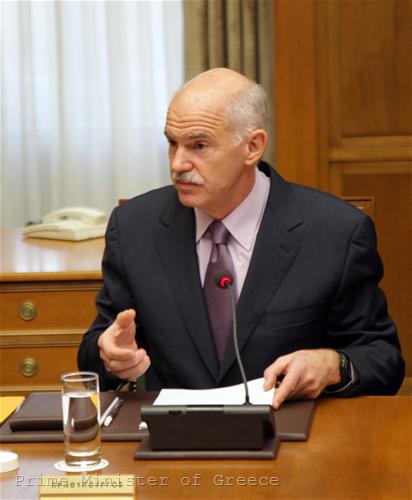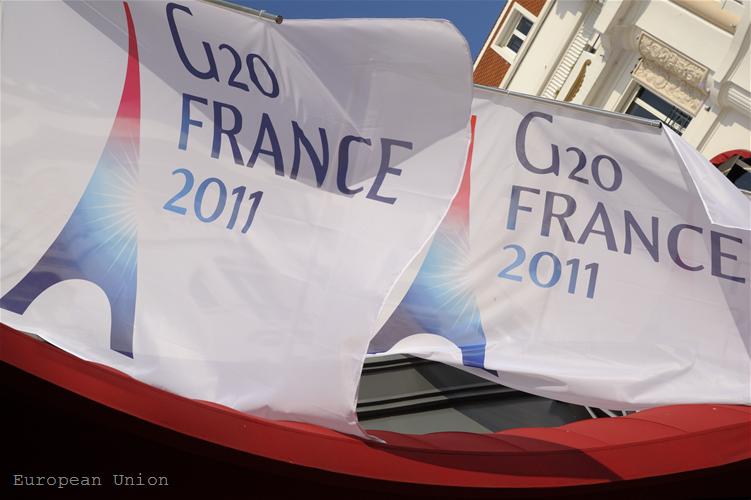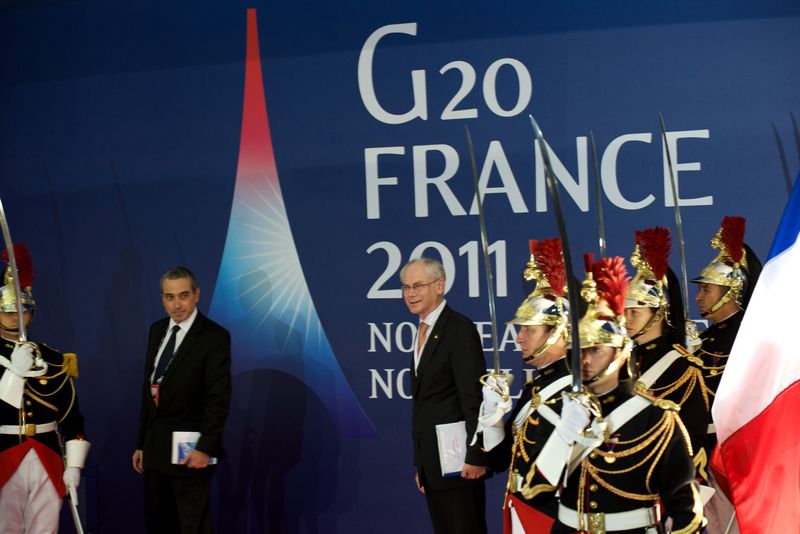G20 Is Looking for Its Profile in the Fight with the Crisis
Adelina Marini, November 9, 2011
 G20 will remain an informal global format, the leaders of the group of the most influential economies in the world have decided after endorsing the global governance report of British PM David Cameron. After this decision it is absolutely logical to ask - what meaning then do the agreements of the Twenty have? This question is vitally to be answered now when in the framework of only a few pages the leaders practically reiterate commitments they had undertaken at previous summits. Even more pressing is this question to receive an answer in the current moment of global economic uncertainty because it concerns all the participants in this forum, which has become actual because of the 2008 crisis, although it has been created 10 years earlier (because of another big crisis - the Asian crisis of 1997).
G20 will remain an informal global format, the leaders of the group of the most influential economies in the world have decided after endorsing the global governance report of British PM David Cameron. After this decision it is absolutely logical to ask - what meaning then do the agreements of the Twenty have? This question is vitally to be answered now when in the framework of only a few pages the leaders practically reiterate commitments they had undertaken at previous summits. Even more pressing is this question to receive an answer in the current moment of global economic uncertainty because it concerns all the participants in this forum, which has become actual because of the 2008 crisis, although it has been created 10 years earlier (because of another big crisis - the Asian crisis of 1997).
In the very beginning of their joint communique the leaders of the Twenty point out that since their last summit global recovery has weakened, especially in the advanced economies, leaving unemployment at unacceptably high levels. "In this context, tensions in the financial markets have increased due mostly to sovereign risks in Europe; there are also clear signs of a slowing in growth in the emerging markets. Commodity price swings have put growth at risk. Global imbalances persist", is said in the introduction.
Only these few sentences are maybe the best assessment of the meaning of the G20, which was loaded with extremely high expectations against the backdrop of the current global economic problems because of the possibility the generators of nearly 90% of the global gross domestic product to unite their efforts for the sake of achieving the common goal - stable economic growth, down-falling unemployment and growing welfare that should take into account the challenges our very planet is facing - the population has reached 7bn people already, limited natural resources, big welfare gaps between poor and rich.
Give me some growth
The G20 leaders have agreed an Action Plan for Growth and Jobs that is supposed to address the short-term challenges and to enhance the medium-term foundations for growth. For homework the advanced economies pledge to endorse policies that would build trust and would support growth. They also commit to undertake clear and specific measures for fiscal consolidation and, very importantly - these measures to be convincing. The countries with strong public finances promise to leave the automatic stabilisers to work and to undertake discretionary measures in support of domestic demand in case that economic conditions deteriorate. This strange sentence, given the wording, probably means that certain forms of protectionism will be tolerated but at a certain extent.
The countries with large current account surpluses (China, Germany) are expected to undertake reforms aimed at increasing internal demand, "coupled with greater exchange rate flexibility", is added in the text. This is obviously directed to China which artificially suppresses the exchange rate of the renminbi and allows its gradual appreciation under strict state control, which is in conflict with the expectations of the developed countries for market definition of the exchange rates.
What is interesting is that precisely in this context is written the G20's opinion about the situation in Europe. In not many sentences, the communique welcomes the decisions of the European leaders of October 26 to restore debt sustainability in Greece, strengthen European banks, build firewalls to avoid contagion, and lay the foundations for robust economic governance reform in the euro area. The leaders also welcome Italy's decision to invite the IMF to carry out public verification (meaning the results will be published) of its policy implementation on a quarterly basis.
Regarding the growing social tensions in many countries - both advanced and  catching up, the leaders express determination to enhance the social dimension of globalisation. This means, according to the communique, that whatever decisions are to be taken employment and social inclusion will be at the centre. For the purpose, a task force will be established to work on the problem of youth unemployment - a problem, which was emphasised very clearly in the Arab Spring countries, but as data shows in Europe too is growing the number of young undereducated people. This is a precondition for serious social unrest, the scale of which we can guess recalling the clashes in Britain this summer.
catching up, the leaders express determination to enhance the social dimension of globalisation. This means, according to the communique, that whatever decisions are to be taken employment and social inclusion will be at the centre. For the purpose, a task force will be established to work on the problem of youth unemployment - a problem, which was emphasised very clearly in the Arab Spring countries, but as data shows in Europe too is growing the number of young undereducated people. This is a precondition for serious social unrest, the scale of which we can guess recalling the clashes in Britain this summer.
Again a reform of the international monetary system
The reform of the international monetary system has been discussed for several years now as it was created in the end of World War II and is known as the Bretton Woods reform. The current global economic situation in no way is reflected in the global monetary system. The G20 leaders report progress in that reform, for which especially persisting was French President Nicolas Sarkozy for whom this reform was a major priority for the one-year long French Presidency of the G20 which ends on November 30. One of the main agreements at the Cannes summit was in 2015 a full review to be made of the composition of the SDR basket (special drawing rights). At the moment this basket consists of four major reserve currencies: the euro, the dollar, the yen and the British pound.
China has insisted for a long time its national currency to be included in this basket, as well as Russia's rouble, but this would mean an overhaul of the representation and voting rights in the International Monetary Fund. Until the full review is done, the IMF is tasked to make an overall assessment on the basis of the existing criteria. The purpose is adjustment to the currencies' changing role. In this context, at the summit in Cannes the G20 countries have committed to endorse more flexible exchange rates regimes, and to do that fast in order to allow them reflect the market realities. This is obviously the condition tabled for the countries that want their currencies to be added to the SDR basket.
Now where to?
 As it becomes clear from this part of the communique of the G20 leaders, which we focused upon, obviously a heavy responsibility lays on the shoulders of the G20 to do what is necessary to restore economic growth. An expectation which is clear the G20 at this stage cannot respond to. In this sense is the comment of the Brookings Institution - an American think-tank. According to Eswar Prasad, aside from tackling crises the group has turned into a real agenda-setting institution for economic and financial policies. "This broader role has generated existential questions for the G-20, not just about its effectiveness but also its legitimacy and role in the international monetary system".
As it becomes clear from this part of the communique of the G20 leaders, which we focused upon, obviously a heavy responsibility lays on the shoulders of the G20 to do what is necessary to restore economic growth. An expectation which is clear the G20 at this stage cannot respond to. In this sense is the comment of the Brookings Institution - an American think-tank. According to Eswar Prasad, aside from tackling crises the group has turned into a real agenda-setting institution for economic and financial policies. "This broader role has generated existential questions for the G-20, not just about its effectiveness but also its legitimacy and role in the international monetary system".
In the G20 communique it is said: "We welcome the report of UK Prime Minister David Cameron on global governance. We agree that the G20 should remain an informal group. We decide to formalise the Troika [past, current and future presidencies]. We will pursue consistent and effective engagement with non-members, including the UN and we welcome their contributions to our work".
Mr Prasad thinks that the size of the group (20 members) makes it much nimbler than institutions like the UN and the IMF. Besides, it is relatively new, the analyst writes, it is not burdened by a complex bureaucratic structure, and includes the key players on the global economic stage. All this makes the G20 a potential power that can promote economic welfare by improving domestic and global macroeconomic and financial stability. For the purpose, though, the leaders of the Twenty have to swallow the temptation and to leave aside their national narrow interests and to focus on the long-term benefits for the global economic system. "Otherwise, the enormous potential of the G-20 in preventing rather than just coping with crises will go unrealised. The choice is clear", the author with the Brookings Institution concludes.
 | © Prime Minister of Greece
| © Prime Minister of Greece | © European Union
| © European Union | © European Union
| © European Union